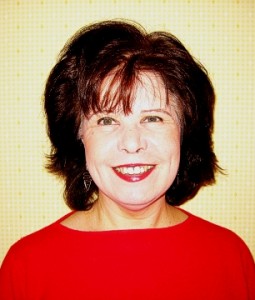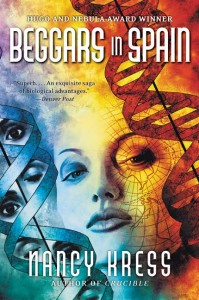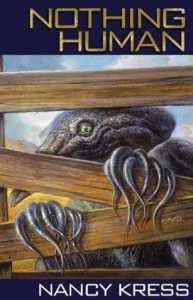Nancy Kress is a prolific author, having written more than sixty short stories,  sixteen science fiction novels, three fantasy novels, four short story collections, and three books on writing. Her book on the elements of fiction writing, Beginnings, Middles & Ends, is often considered to be one of the best in the Writer’s Digest series for fiction writers. Nancy’s won two Hugo Awards and four Nebulas, and teaches regularly at writers conferences and workshops. I’m thrilled to have her stop by for a visit.
sixteen science fiction novels, three fantasy novels, four short story collections, and three books on writing. Her book on the elements of fiction writing, Beginnings, Middles & Ends, is often considered to be one of the best in the Writer’s Digest series for fiction writers. Nancy’s won two Hugo Awards and four Nebulas, and teaches regularly at writers conferences and workshops. I’m thrilled to have her stop by for a visit.
* * *
MIKE: Nancy, thanks for joining us! You’ve won lots of awards, written columns for Writer’s Digest, numerous novels, books on craft, even served as a Guest Professor at the University of Leipzig in Germany. So what do you consider your greatest “accomplishment” as a writer?
NANCY: There are many ways to answer that. Just staying in the publishing world for thirty-five years ought to count as an accomplishment in itself. If you mean which book am I proudest of, I have a few favorites: STINGER, BEGGARS IN SPAIN, NOTHING HUMAN. I’m also proud and pleased to have taught so many promising students whatever it is I’ve learned in those thirty-five years.
MIKE: You’ve crossed genres several times: From fantasy to sci-fi to suspense and back. Is that transition between genres difficult? And is there a genre you’d like to write but haven’t?
NANCY: The transition is very difficult in terms of sales. Fantasy fans are disappointed that I wrote SF, and vice-versa. Thrillers, an entirely different audience, are even worse. Nonetheless, I do it because I write whatever excites me at that moment. As for untried genres — well, I’ve  always had a secret hankering to write a Regency, the only kind of romance novels I like. Maybe eventually I will!
always had a secret hankering to write a Regency, the only kind of romance novels I like. Maybe eventually I will!
MIKE: There’s much debate about the state of the publishing industry and the future of books in general. Are you encouraged or discouraged about the direction things are headed? While some say that self-publishing and ebooks have watered-down the quality of novels, others claim the empowering of authors will only benefit readers in the long run. What’s your take on the climate of industry for publishers and authors?
NANCY: For authors, it’s bewildering. Do I spend the time and/or money to convert my backlist to e-books? Are my print sales going down? Different writers I know seem to have different experiences with the new technologies. My own have been mediocre – my e-book backlist is selling, but not terrifically well. I don’t know about the newer books. Meanwhile, kerfuffles keep happening – as I write this, my new book from Tachyon, AFTER THE FALL, BEFORE THE FALL, DURING THE FALL may not be available on Amazon when it comes out next month, because Amazon is fighting with Tachyon’s distributor, IPG, and has removed all IPG books from its shelves. This kind of thing keeps happening. However, as to the “quality of novels becoming watered down” – I don’t think that’s true at all. Writers write as well as they can. The rest is just marketing. Nobody writes a worse book because it will eventually be offered for the Kindle.
MIKE: In “Beginnings, Middles, and Ends,” you wrote about the “temptation to polish forever.” I am one of those perfectionists who has a tendency to want to “polish forever.” How does a perfectionist writer overcome these dreaded impulses, or are we doomed?
NANCY: Never doomed! No! What you have to do is be firm with yourself. Set a number of drafts you will do: three maybe, or four. After that, it gets sent out. Get someone to nag you about it, a wife or writing buddy.
MIKE: You teach workshops on “Writing in Scenes.” How did you come to focus on that subject?
NANCY: A scene is the basic unit of writing fiction. It has a purpose, a shape, and a mini-climax. Thirty-five years ago, writing in scenes is what moved my writing from perennially rejected to salable.
MIKE: Like most writers, you started out juggling careers, responsibilities, and dreams. Most “part-time” writers yearn to go full-time. What “lessons” do you think a “part-time” writer needs to learn before they can successfully go full-time?
NANCY: The usual rule is supposed to be that you can go full-time when your writing income is 2/3 of your day-job salary. I didn’t do that. I went full time in 1990 because I had a terminal fight with my then-boss  and quit. I don’t recommend this method. Some things that help with the decision: Does your household have a second income? Is the earner of that second income supportive of your writing? Have you sold at least one novel, so that you know you can? Do you have savings? If you leave your job, is your field or employment history such that you can reasonably expect to get another job if you have to? Is your family willing to reduce its standard of living to support your dream? Are you trying to send twins through Harvard?
and quit. I don’t recommend this method. Some things that help with the decision: Does your household have a second income? Is the earner of that second income supportive of your writing? Have you sold at least one novel, so that you know you can? Do you have savings? If you leave your job, is your field or employment history such that you can reasonably expect to get another job if you have to? Is your family willing to reduce its standard of living to support your dream? Are you trying to send twins through Harvard?
MIKE: Social media has changed how authors build an audience. Conventional wisdom used to say, It’s all about story. However, now it’s more than story that seems to connect an audience. Facebook, Twitter, blogging, etc. What advice would you give the aspiring author about social media? How important is an active social media presence to competing in the current market? Or is it necessary at all?
NANCY: I have no hard data on this. I am bad at social media. I tweet occasionally, am a Facebook drop-out, and blog only because I like doing it. But my blog is non-controversial. I think that yes, all this has hurt my sales. Charlie Stross’s blog has over 12,000 followers. But he takes one and half entire days each week to research and write it. I’m just not willing to do that – from laziness, or preference to write instead, or just being the wrong generation for a full-court press on social media.
MIKE: We talk a lot about Christian fiction on my blog. However, Christian fiction and the speculative fiction genre have a tenuous relationship. Many Christian writers and readers are dissatisfied with the lack of spec-fic represented in the Christian market. However, Christian themes are not an easy sell in the general market. What advice would you give to the author who wants to include Christian themes in her story, but is unsure of what market to shop? And is the general market that averse to Christian speculative fiction?
NANCY: Yes, the SF market is pretty averse to Christian themes. SF is a very inclusive genre – we accept three-headed green aliens, etc. – and the general perception, rightly or wrongly, is that Christians can be exclusive: “We have the handle on truth and you don’t.” Also, of course, there is a tension between science and religion because they are such different ways of experiencing the world. My advice to a Christian SF writer would be to use that tension deliberately — as Ted Kosmatka did, for example, in “The Prophet of Flores,” or Arthur Clarke in the classic “the Star” – to examine the strengths and weaknesses of both science and religion. It can be done.
MIKE: SF themes and tropes seem to be slowly creeping into acceptance in mainstream films and books. Futuristic technologies are no longer just the domain of SF writers. Do you think this reality has translated into more SF fans and a greater “acceptance” of the genre?
NANCY: I think it has translated into more media fans, for movies and perhaps even podcasts. I don’t think, alas, it’s made more readers of SF — especially since places like THE NEW YORK TIMES are still careful to call any future-based fiction they like, anything but “science fiction.”
* * *
Great stuff! Nancy will be teaching the Early Bird session at this year’s ACFW conference, in a course entitled Writing in Scenes. If you’d like to find out more about Nancy, you can check out her website HERE. Once again, thanks to Nancy Kress for visiting!














Informative and interesting…thanks!
Great interview! Beginnings, Middles, and Ends is a very helpful book that should be read by all fiction writers. Also, I’d heard somewhere that Nancy was writing a YA novel under a pen name. Is this true?
Normally I don’t read interviews on blogs, this was my first. I am very interested in what Mike and Nancy have talked about here. My own work in progress is a science fiction work with a Christian theme and heavy Christian intent though without blatant Christian tropes. It has been making me feel almost unmarketable because there is little outlet or demand for Christian Science Fiction. I didn’t choose to write this based on the lack of other works, but have started to think that it could be a good thing that this is what I am writing about.
I will be looking more deeply into Nancy’s works now, and have subscribed to her blog.
I concur with Jonathan above. I don’t normally like to read author interviews. This was fascinating, however. Thank you, Nancy.
Great interview. Nancy, thanks for the insights here, on your blog, in the many WD articles you wrote over the years you were the fiction columnist, and in Beginnings, Middles, and Ends. I am impressed when someone of your skill and knowledge “gives back” to those of us coming along behind.
Becky
Good interview, Mike and Nancy. I used to read Nancy’s articles in Writers Digest.
Mike,
That was a good interview with Nancy Kress.
I will definitely check out her book: Beginnings, Middles, and Endings.
Marion
Lovely interview!
Nancy, I LOVE this interview. I can’ t tell you how much you inspired me as a beginning writer through your Writers Digest column. And I just purchased the Nothing Human ebook–am loving it.
Mike, Another great interview!